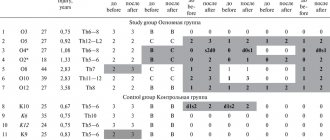What is epidural anesthesia?
When treating patients, various medications are prescribed. These include painkillers of varying degrees of action. Epidural anesthesia, or epidural, is one of the methods of pain relief in order to eliminate any sensitivity in the patient’s body below the waist. Despite the fact that this method has its obvious and undeniable advantages, some patients complain that their back hurts after epidural anesthesia. Accordingly, questions arise about why this happens, and what needs and can be done to make the discomfort go away faster?
Causes of pain after anesthesia
After an epidural, your lower back hurts for a variety of reasons. Firstly, any intervention, including invasive ones, can cause adverse reactions. An epidural punctures tissue near the spinal column. The answer to the question of whether your back can hurt after epidural anesthesia is obvious in this case. Pain is a completely normal reaction, but it should not bother the patient for too long.
The maximum amount of back pain after epidural anesthesia (in the absence of medical error) is several days
You should also pay attention to the nature of the pain. The pain should not be intense, but rather dull and mild, as with any other injection procedure
No medications or additional measures are required; the discomfort disappears on its own.
Secondly, the situation is much more serious if the injection site becomes infected. The reason is the medical staff’s failure to comply with the rules of asepsis and antisepsis (use of non-sterile instruments, poor treatment of the injection field, etc.). This doesn't happen often. Infection can also occur if the catheter is left in place for too long (several days).
Bacterial infection is accompanied not only by pain, but also by other signs of inflammation: redness and swelling of the skin, fever, and deterioration of the condition in general. Hyperthermia, dizziness, and severe headache appear. The condition is fraught with the possibility of developing an abscess or sepsis. In this case, emergency medical attention is required, as very serious complications (generalized infection) may develop. Treatment consists of surgery, antibiotics and other drugs.
Pain after an epidural may occur due to medical error
The lower back hurts more severely in patients with intervertebral hernias, although the disease is not a contraindication to pain relief. Also, the back may hurt due to irritation by the anesthetic of the nerves located at the site of intervention. These conditions do not require specific treatment.
The psychological factor also plays a significant role. The patient realizes that a rather serious manipulation is being performed, expects severe pain, stresses himself out and ultimately experiences discomfort. Sedatives help solve the problem. Such patients may complain that their neck, head, back and even internal organs hurt. At the same time, the doctor should not ignore the listed complaints, but must make sure that there are really no complications.
If the cause of the pain is never identified, the discomfort is called idiopathic pain. It goes away on its own after some time. As for women who used an epidural for labor pain relief, their discomfort was caused not so much by anesthesia, but by the load on the entire skeleton caused by pregnancy and childbirth.
When is it prescribed?
Before answering the question of what to do if your back hurts after epidural anesthesia, you need to understand what this procedure involves and when it is prescribed. Medications are administered by catheterization (through catheters into existing cavities in the human body) into the space of the spinal cord. The puncture site is also anesthetized so that the patient does not experience any pain when the painkiller is administered. The effect after the administration of medications occurs within 10–15 minutes. Most often, an epidural is prescribed to women in labor - during childbirth or when a caesarean section is scheduled. In such cases, it is important not to harm the fetus, and this method is safe for the baby. In addition to obstetrics, epidurals are prescribed in urology, gynecology, and during surgery in the abdominal cavity or on the pelvic organs.
Back pain after spinal anesthesia: what to do
There are situations when your back hurts after spinal anesthesia; we will discuss what to do in this case and how to get rid of the pain later in the article. Spinal anesthesia is a complex procedure and requires the concentration and skill of the doctor performing the procedure. But sometimes, even with the ideal work of the anesthesiologist, the spine hurts severely after spinal anesthesia. This syndrome is associated with concomitant pathologies in 95% of cases. Yes, there are 5% who attribute it to cauda equina syndrome. In this case, unsuccessful needle insertion damages the lower spinal cord. But this happens extremely rarely.
Why does my lower back hurt after spinal anesthesia?
First you need to figure out if the injection site may hurt. This happens very often. This type of anesthesia uses a long needle that is inserted into the spine. This creates a hole in the lining of the spinal cord. Therefore, pain is completely understandable and natural. In such cases, the pain lasts for several days. The pain will be rather aching, without attacks. Sometimes a hematoma develops at the injection site. Then the unpleasant sensations can last until it goes away.
This effect can occur with a spinal hernia, about which the patient previously knew nothing.
There may be a tingling sensation at the time of injection. This is a manifestation of the effect of anesthesia, it will pass in a couple of minutes.
Don't forget about the psychological factor. Self-hypnosis and fear are terrible things that can ruin your life. In the absence of pathologies and a correctly performed manipulation, there should be no pain, and this is what you should count on.
Separately, it is worth mentioning caesarean sections. As a rule, the back hurts after spinal anesthesia during cesarean section, not because of incorrectly performed manipulation, but because the spine experienced a colossal load during pregnancy, and after childbirth it disappeared. It takes time for the spine to adapt to new conditions. Such pain is possible for several months, then it goes away on its own.
Treatment
To prescribe treatment, the cause must be determined. Perhaps everything will go away on its own in a couple of days. In rare cases, ibuprofen is prescribed. It relieves inflammation and calms pain. Its analogue, Nurofen, is also suitable. If there is no inflammation at the injection site, then warm compresses can be used.
When a wound becomes infected, immediate treatment with antibiotics is necessary.
When it comes to cauda equina syndrome, treatment is selected individually for a specific case. Both conservative methods and surgical interventions are possible.
Conclusion
After spinal anesthesia, pain is possible. In most cases, they go away on their own within a couple of days. If the pain is severe, ibuprofen or warm compresses are prescribed.
I created this project to tell you in simple language about anesthesia and anesthesia. If you received an answer to your question and the site was useful to you, I will be glad to receive support; it will help further develop the project and compensate for the costs of its maintenance.
Why does my back hurt after epidural anesthesia?
When the medications stop working, the patient begins a recovery period, which is accompanied by various sensations. Sometimes patients experience back pain after an epidural, and how long it hurts and whether any treatment is needed depends on the type and complexity of the surgery and the resulting complications. The occurrence of pain of varying degrees and localization occurs for various reasons. How quickly does a patient recover after receiving an epidural, and what can happen? Timing and response are individual indicators. The causes of pain are also varied.
Infection
Infection develops where the needle was inserted, for example because mistakes were made during disinfection. In some cases, a problem arises if the catheter is left in the patient's body when additional and longer-term pain relief is required.
Intervertebral hernia
If the pain persists for several months or longer, then most likely the patient has an intervertebral hernia. It is not a contraindication to an epidural, but may be an individual feature that should be taken into account when prescribing this method of pain relief; in any case, careful monitoring of the patient’s condition is required.
Medical errors
Back pain after epidural anesthesia may also have a cause such as medical error. This happens if the doctor touches a bunch of veins when installing a catheter and inserting a needle. This is rare, but patients who take medications to improve blood circulation are at risk (this should be noted in the medical history). Also, when carrying out the necessary manipulations (in the absence of sufficient experience on the part of the doctor), the hernia or ligaments, as well as the roots of nerve fibers, may be damaged. Your back may also hurt after epidural anesthesia for a caesarean section. This happens because the mother’s center of gravity moves, and the body needs time to adjust to a new state and cope with the stress experienced.
Consequences after epidural anesthesia
One of the most common consequences of such a procedure is back pain, which can occur:
- during anesthesia;
- in a week or two;
- after a few months (years).
The back may hurt only due to the fact that the dura mater of the spinal cord was punctured with a needle and a small amount of fluid penetrated into the epidural space. The syndrome is treated only with medication. In some cases, the puncture is repeated and the patient's own blood is then injected to seal the puncture.
In addition to the fact that your back may hurt, there is a possibility of other manifestations:
- Allergy. If the patient has never experienced anesthesia before, a predisposition may occur. As a result, sometimes anaphylactic shock develops, which will lead to disruption of the functioning of important organs. To eliminate this possibility, a small dose of anesthesia is first administered during the procedure.
- The rarest consequence is difficulty breathing. This reaction is the result of the effects of drugs on the nerve endings that follow the intercostal muscles.
- Low blood pressure, causing vomiting and nausea. To prevent such consequences, an IV is placed before the procedure. After inserting the catheter, it is recommended to lie down for a while.
- Problems with the bladder and urination (hypotonia).
Without taking into account the above complications, paralysis of the lower extremities is also possible.
Elimination of pain after the procedure
Normally, the body and body sensitivity are restored a short time after the procedure. If this does not happen, it is recommended to consult a neurologist
who will find out why your back hurts after epidural anesthesia and what to do to relieve the discomfort.
Painkillers
During normal recovery, no painkillers or other medications are required. But if the intensity of the pain is strong enough and lasts a long time, only a doctor can help you choose the right painkillers depending on what the epidural was needed for and why the pain occurred.
Seeing a doctor
If there is inflammation or irritation, then treatment will require taking antibiotics prescribed by a doctor, and in case of an abscess and serious suppuration, treatment by a surgeon is necessary. The doctor can also give valuable recommendations on nutrition - especially for overweight patients or women after childbirth, as well as on physical activity to strengthen the muscle corset. Additionally, a course of vitamins may be prescribed.
Causes of pain after epidural anesthesia
The spine and back may hurt after an epidural for a number of reasons. This method of anesthesia is used during various operations, not just during childbirth, so the injection can be given in different areas of the spine. For women in labor, an injection is given in the lumbar region. As a result, the lower back may be quite painful when the anesthetic effect wears off.
Short-term and not too intense pain in the spine is a natural reaction to tissue damage as a result of manipulations to install a catheter
In this case, the pain should go away on its own within a few days.
But in some cases, painful sensations do not go away on their own, but only become more intense over time. The reason for this may be infection. Getting an infection into the tissue directly when a needle is inserted is very rare, but if the catheter is not removed for 4 days or more, then the likelihood of infection increases.
The following symptoms may indicate an infectious infection:
- severe back pain;
- dizziness and headaches;
- heart rhythm disturbance;
- increase in body temperature.
When an infection occurs, acute inflammatory processes begin in the body. In this case, serious complications may develop: purulent epiduritis and abscess. This can be avoided only by timely measures taken. In some cases, surgery is possible, but is usually only required if medication has not produced the desired results.
Some patients develop idiopathic pain, the cause of which lies in the psychological mood of the patient.
If a person is afraid of the consequences of an epidural, his fears and doubts can cause painful sensations based on nerves.
Sometimes back pain is not associated with epidural anesthesia, although it occurs after it. In this case, the examination allows you to identify the real causes of discomfort; you just need to consult a doctor. Such situations are most often encountered by women after childbirth. During pregnancy and at the time of childbirth, a woman’s body experiences an increased load on the spine, which leads to back pain, and the woman mistakenly associates their occurrence with the use of epidural anesthesia.










